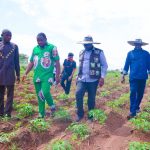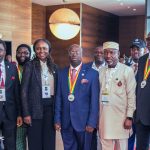Dr Abdullahi Ganduje, National Chairman of All Progressives Congress (APC), has said the Nigerian livestock industry would be valued at N50 trillion over the next 10 years.
Ganduje, who stated this on Tuesday at the opening ceremony of the 12th Joint Annual Meeting of the Nigerian Institute of Animal Science (NIAS) and the Animal Science Association of Nigeria (ASAN) in Abuja, said Nigeria’s livestock sub-sector has huge market potential.
Ganduje, a former Governor of Kano State, who was honoured with the investiture of the prestigious honorary fellowship of the Nigeria Institute of Animal Science, pointed out that “With the proper infrastructure and support for value chain development, expansion and sustenance, financing, research and development for new breeds, as well as, capacity development of operators in place, the Nigerian livestock industry could be valued at N50 trillion over the next decade.”
He said: “The current worth of the industry would therefore constitute approximately 20 percent of Nigeria’s Gross Domestic Product(GDP) and more than 30 percent, at the rate of the 10-year projected figure, against today’s GDP.”
In his keynote address entitled,”Towards a Sustainable Livestock Production System for National Economic Development,” he tasked participants made up of animal scientists, academia, policy makers, veterinarians, crop/livestock farmers and livestock commodity associations to think outside the box and find ways by which Nigerian livestock industry could be enhanced in terms of productivity, increased market accessibility of animals and animal products.
According to him, “The Nigerian livestock sub-sector is very vital to the socio-economic development of the country and it represents an important source of high-quality animal protein, contributing 36.5 percent of the total protein intake of Nigerians.
“It also generates employment, income, and earns foreign exchange for the country.
“The livestock sub-sector in 2022 was estimated to contribute about 17 percent of the Agricultural Gross Domestic Product (GDP) and 5.0 per cent of the national GDP.”
“There is no doubt that the time has come when all critical stakeholders must all join hands and close ranks, to think outside or without the box on how our animal husbandry sector can achieve quantum leap.”
Also speaking, Senator Aliyu Sabi Abdullahi, Minister of State, Federal Ministry of Agriculture and Food Security, explained that with the huge potentials in livestock resources alongside low intake of animal sourced protein, that the present administration has set its focus on ensuring that all Nigerians have access to balanced and wholesome diet.
Abdullahi said this can be realised only through making the livestock sub-sector of the economy viable enough not only to provide affordable source of protein but also create employment and earn foreign exchange for Nigeria.
He assured that his Ministry is relying on
the strong political will of Mr.President who recognises the significance and strategic importance of the livestock sub-sector in Nigeria’s quest for sustainable economic development, and has made it a priority sector in its economic development plans and programmes.
He said: “The National Livestock Transformation Plan (NLTP), meticulously being implemented by FMAFS is a testament to the commitment of the present administration to create a robust, vibrant and competitive livestock sector capable of meeting the national demand for animal protein and place Nigeria among top players in the global livestock economy.
“The Ministry is promoting livestock programmes that have received the good attention of the Federal Executive Council in an effort to bridge the gap between demand and supply of animal and animal products.
“Some of these include: National Pasture Development Programme (NPDP) is focused on promoting homestead and commercial pasture production for sustainable ruminant production and reduce conflicts between crop farmers and Livestock herders.
“The National Livestock Breeds Improvement Programme (NALBIP) and National Animal Breeding Policy by the Department of Animal Husbandry Services are further efforts towards improving productivity of our animals for increased output.
“Dairy Development Programme (DDP) where the Ministry is in collaboration with key multinational and national players in the dairy industry such as FCWAMCO, ARLA FOODS, L&Z, etc.
“National Strategic Animal Feed Programme for harnessing available natural feed resources in Nigeria for improved livestock production.”
In his opening remarks, Prof. Baba Yusuf Abubakar, President of Nigerian Institute of Animal Science, pointed out that the
issue of food and nutrition security was very critical and central to the Renewed Hope Agenda of the present administration.
Abubakar, assured that NIAS, as a regulatory body in the livestock sub-sector, would continue to strive to be very innovative, strategic and transformational.
He added that the Institute would work with all stakeholders from government, academia and particularly, the industry, in order to be more impactful.
The theme of the Conerence was, “Pathways to Addressing the Challenges of Climate Change in Animal Agriculture.”











